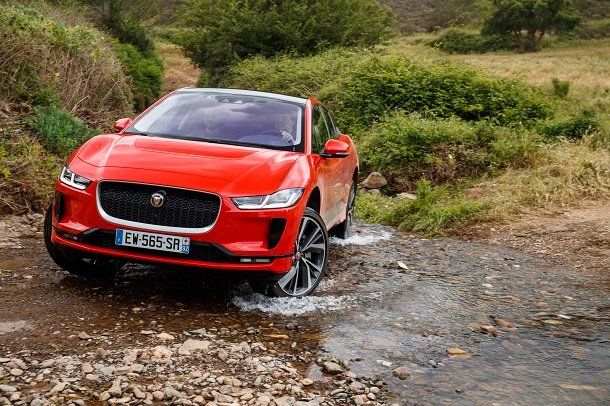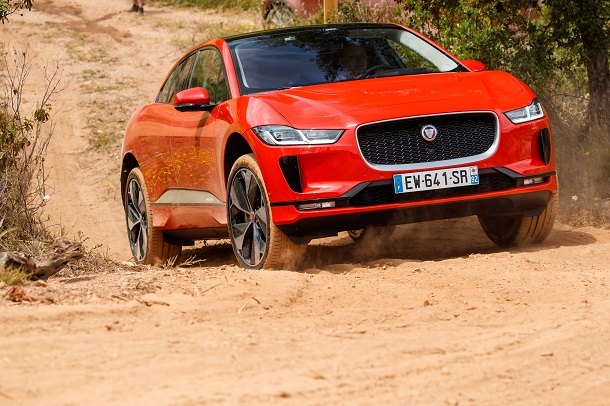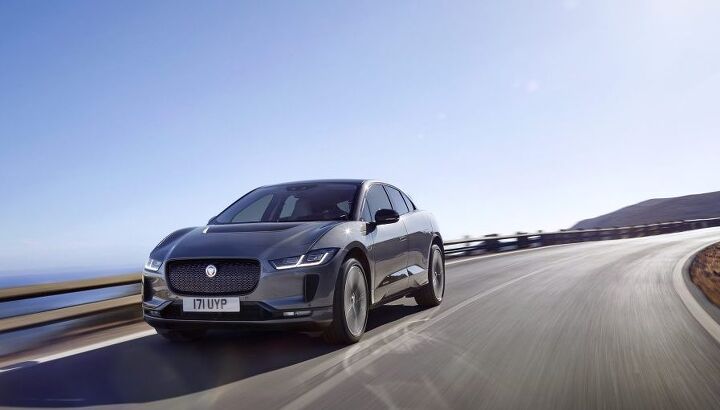#JaguarI-Pace
Jaguar Is Going to Try and Sell the I-Pace in India
Jaguar Land Rover unveiled its all-electric SUV to the Indian market this week, proving that it’s dead serious about expanding the I-Pace’s customer base. While parent company Tata Motors undoubtedly has a fondness for its home region, we cannot help but wonder if its a market worthy of pursuit considering the model’s starting price.
The manufacturer has the (90-kWh) I-Pace stickered at 105.91 lakh rupees, which translates to about $147,000 USD. Considering the unique way India writes out denominations and often transitions between crore and lakh as a way to avoid listing high-value items in the millions of rupees, we were initially convinced we’d messed up the conversion. The sum would not only eclipse the $70,000 MSRP Jaguar has affixed to the I-Pace in the United States, it makes it highly uncompetitive against the luxury EVs already on a market that’s not known for its wealthy consumer base. How could this be JLR and Tata’s preferred strategy?
Extremely Green Cars Showered With Another Kind of Green
Want to wear your environmental activism on your sleeve? Park some of it in your driveway.
Gone are the days when driving an electric car required careful trip planning — and white-knuckled, pit-stained trips to the suburbs. Automakers have finally endowed their greenest rides with enough range to keep anxiety mostly at bay.
And, because there’s a pandemic (among other factors impacting electric vehicle sales), some of those same OEMs really want to move those cars off the lot. There’s deals to be had, greenies.
2019 Jaguar I-Pace EV400 HSE Review - EV Growing Pains Persist
Jaguar’s I-Pace electric hatchback provides an interesting driving experience. When it has enough charge to be driven, that is.
The I-Pace I drove for a weekend last summer spent much of that time at the dealership, charging, because it failed to charge anywhere else near my home.
More on that in a minute.
Battery Shortage Dims the Lights on Jaguar I-Pace Production
Jaguar Land Rover is reportedly putting I-Pace production on hold for a week thanks to a battery shortage at supplier LG Chem.
While sales of the model are ridiculously low in North America, European deliveries average about 1,000 units per month. That’s comparable to the Audi e-Tron, which also suffered production delays due in part to its relationship with the supplier. Before that, Hyundai was the one pointing the finger at LG Chem after running out of batteries for the Ioniq EV.
The 8-percent Solution: Range Boost Incoming to Jaguar I-Pace Owners
Maybe electric racing does have something to offer the common man. Jaguar credits its Jaguar I-Pace eTrophy race series (outside makes need not apply) for returning data that proved useful in eking out additional range from the electric crossover’s 90 kWh battery pack.
As things are all very modern in 2019, all Jag needs to do to pass the fruits of that knowledge on to consumers is fix them up with a software update.
Plow King: Electronic Nannies Give Jaguar I-Pace a Black Eye in Moose Test
Jaguar’s electric I-Pace (not to be confused with the gas powered E-Pace) earned unflattering press this past summer after slow sales led to ballooning inventories of the brand’s first EV. Now, there’s another PR stroke against the model, and electricity once again lies at the core of the issue.
As new safety features proliferate across the industry, electronic stability control stands out as one of the veteran lifesaving nannies, joining the fray after anti-lock brakes, airbags, and crumple zones became the norm. In the I-Pace’s case, ESC conspired to turn the model’s “moose test” into a viral sensation.
2019 Jaguar I-Pace Delivered Early to Average American Family
Jaguar has delivered its first I-Pace electric crossover in North America, a little ahead of next month’s retail sales, to a picture-perfect family living in Florida. Who are these fortunate environmentalists? None other than Lakewood Ranch residents Mark and Holly Pascarella, according to Jaguar Land Rover’s Tuesday press release and the multitude of auto outlets that reported it as news without commentary.
“When you have a family of five you always need space, so we were looking for an SUV,” explained Mr. Pascarella. “We’ve always had a seven-passenger SUV, but one of my daughters just went off to college, so now a five-passenger SUV will be large enough. When I looked at the I-PACE I could see that it was a typical first-class product made by Jaguar, with top of the line appointments and great looks. It doesn’t look like a typical SUV, and on top of that, being electric was very appealing.”
Based on Mark’s very natural and clearly unprompted manner of speaking, it certainly sounds like the perfect automotive product for families living in a city with an average household income of $100,991 — which, coincidentally, is exactly the case in Lakewood Range, Florida. Plus, it has that coveted electric appeal, allowing you to indicate you’re environmentally conscious when you aren’t firing up your other Jaguar’s 5.0-liter V8 every morning.
2019 Jaguar I-Pace First Drive - Electric Avenue Now Has More Traffic
Editor’s Note: This article is written by contributor Jeff Taylor. Due to technical difficulties, it is under the TTAC Staff byline. Once those difficulties are fixed, Jeff’s name will be properly attached.
Jaguar’s new I-Pace EV is the first vehicle in the automaker’s plan to fully electrify — or electrically assist — all of its vehicles beginning in 2020.
The I-Pace raises the question: can Jaguar’s EV powertrain live up to everyday driving demands and deliver the premium experience luxury buyers demand without a huge power-suck mileage penalty?
Additionally, mainstream and luxury manufacturers have announced aggressive electrification plans of their own, which puts more heat on Jaguar to get it right or risk its plug being pulled.
To gauge Jaguar’s level of success, I spent some time in Lisbon, Portugal for the I-Pace Media Drive. During the launch program, I put the I-Pace through some tough driving situations and made some surprising discoveries about both the vehicle and what it means for the industry moving forward.
Single-motor Electric Vehicles? Lame, Says Jaguar
Jaguar’s I-Pace seems to be Tesla’s greatest threat, if pre-orders in Europe (and glowing reviews) are anything to go on. The electric SUV, which arrives in the U.S. later this year, features twin motors and a combined output of 394 horsepower and 512 lb-ft of torque funnelled to all four wheels.
This is the only way to build a sporty electric car, Jaguar claims. Speaking at the model’s recent global launch, Jaguar Land Rover’s head of vehicle development, Wolfgang Zeibart, said the company threw out any ideas for a two-wheel drive version.
“If you really want a lame duck then you can do it,” he said. This mantra applies to future Jaguar electrics, which will almost certainly appear with the I-Pace’s platform underneath.
2019 Jaguar I-Pace: Crossing Over Into the Electric Market
After two years of playing hard to get, Jaguar has finally revealed the production version of the I-Pace SUV. Actually, “revealed” may not be the best word to use, as it feels like we’ve already seen it.
The model looks so much like the earlier concept vehicle that most people wouldn’t be able to tell the two apart, even if they sat inside them. The only real difference is that the production Jag has a cushier-looking interior and a tad more ground clearance. Other than that, both vehicles are practically indistinguishable — even down to the flush door handles.
Despite the bewildering decision to name its non-electric compact luxury crossover the E-Pace and its larger, battery-driven brother the I-Pace, the automaker doesn’t appear to have done a bad job with either. While the E-Pace caters to those seeking a small-and-fancy “sport utility vehicle,” the I-Pace is for those seeing an alternative to Tesla’s Model X.
Jaguar I-Pace Concept: Electric Cat to Slink Onto Roads in 2018
Jaguar has pulled the wraps off its I-Pace Concept SUV ahead of the Los Angeles Auto Show, but this prototype isn’t just a one-off piece of vaporware, never to be seen again.
The automaker’s first electric vehicle is a go, and is expected to hit the road in 2018 to challenge Tesla’s Model X in the fledgling premium electric SUV segment.

























Recent Comments